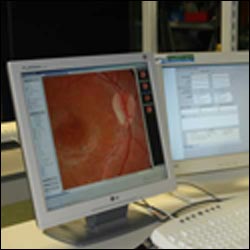Digital Healthcare scores World First with Secure Telemessaging for Eye Screening

Liam Sweeney at Digital Healthcare uses the company’s OptoMize iP software to check for diabetic maculopathy, a common cause of loss of vision in patients with diabetes.
A major community eye screening programme to monitor the sight of 12,000 diabetes patients across Central Lancashire over a 12 month period has scored a world first in using secure messaging telemedicine to successfully transfer patient information between opticians, hospitals and a screening administration centre within the PCTs. The diabetic retinopathy screening programme is using OptoMize, an innovative software product combining digital images of the retina with an electronic patient administration system, to electronically transfer screening results between a network of different computers. OptoMize iP was developed by Digital Healthcare, a Cambridge company that is the UK’s leading supplier of software for diabetic retinal screening programmes and ophthalmology.
The screening programme involves Preston and Chorley & South Ribble Primary Care Trusts, the Royal Preston Hospital and Chorley District Hospital as well as 17 optician practices across Preston, Chorley, Leyland and surrounding villages. It is encouraging all diabetes patients over 12 years old to have a digital photographic screen of their eyes which can detect the early signs of retinopathy, a disease of the retina that is the single largest cause of blindness in the UK.
Digital Healthcare’s OptoMize iP software has been installed on 48 computers in a variety of locations across Central Lancashire so that patients can choose to be screened by an accredited optometrist at their local optician or at an eye clinic in a hospital. The results are transferred electronically between the computers on the same network.
Rob Stichbury, Managing Director of Digital Healthcare, said: “We are delighted to have achieved a world first by successfully telemessaging patient information between the primary and secondary healthcare systems during the Preston and Chorley & South Ribble diabetes retinal screening programme.
It is estimated that there are 1.8 million diabetics in the UK and it is vital that their eyes are screened regularly for retinopathy, which can be treated effectively if it is caught at an early stage. Our OptoMize iP software enables screening programmes to offer patients a choice of locations to attend for eye screening, including opticians in rural areas and hospitals. This maximises the take-up rate and particularly benefits elderly or disabled people who may have difficulty travelling to hospital eye clinics. The deployment of advanced telemessaging means that images and results can be securely and promptly transferred so that healthcare staff have instant access to patient information as they need it, resulting in better preventative care for patients and speeding up urgent referrals for treatment.”
Janet Ashcroft, Health Improvement Manager at Preston PCT, and Alison Johnson, Head of Priority Clinical Services Development at Chorley & South Ribble PCT, have been leading implementation of the digital screening programme, which has been a factor in maintaining the prestigious 3 star status held by both Trusts.
Ms Ashcroft said: “This software has enabled us to really open up access for our patients as we can now offer them the most advanced screening system through a choice of locations. The built-in information system handles data well so we have the capacity to provide a screening service annually instead of every two years. This system is a significant factor in improving the standard of care that we offer to diabetes patients.”
Ms Johnson said: “The key advantages of the software to us are that we are now able to use digital photography for retinal screening, in line with national diabetes screening requirements, and it allows us to operate a centralised and fully-automated electronic information system covering all the patients on the programme.”
“Our screening staff can use the software to manipulate and analyse images of each patient’s retina, and monitor changes by comparing retinal images taken at different points in time. They can also print the images to share with patients, involving them in their treatment. This is much more effective than conventional eye examinations with slit lamps, and film-based retinal images which can be less detailed and deteriorate over time. The software is also fully-automated so the screening administration staff can check patients’ progress through the system, and after screenings, they can automatically generate reports to patients and GPs, or referrals to ophthalmology clinics if further investigations are needed.”
Media Contact
All latest news from the category: Materials Sciences
Materials management deals with the research, development, manufacturing and processing of raw and industrial materials. Key aspects here are biological and medical issues, which play an increasingly important role in this field.
innovations-report offers in-depth articles related to the development and application of materials and the structure and properties of new materials.
Newest articles

Bringing bio-inspired robots to life
Nebraska researcher Eric Markvicka gets NSF CAREER Award to pursue manufacture of novel materials for soft robotics and stretchable electronics. Engineers are increasingly eager to develop robots that mimic the…

Bella moths use poison to attract mates
Scientists are closer to finding out how. Pyrrolizidine alkaloids are as bitter and toxic as they are hard to pronounce. They’re produced by several different types of plants and are…

AI tool creates ‘synthetic’ images of cells
…for enhanced microscopy analysis. Observing individual cells through microscopes can reveal a range of important cell biological phenomena that frequently play a role in human diseases, but the process of…





















